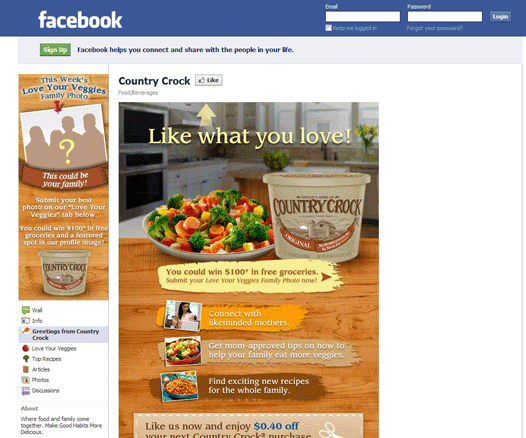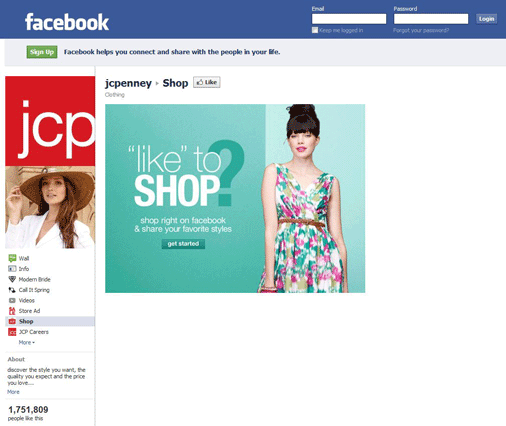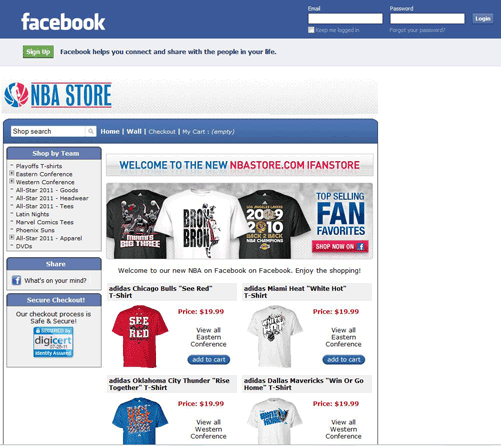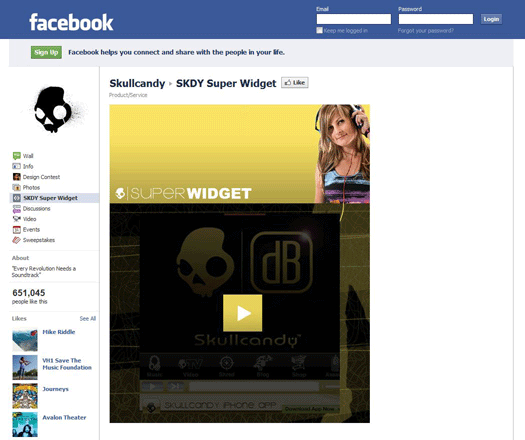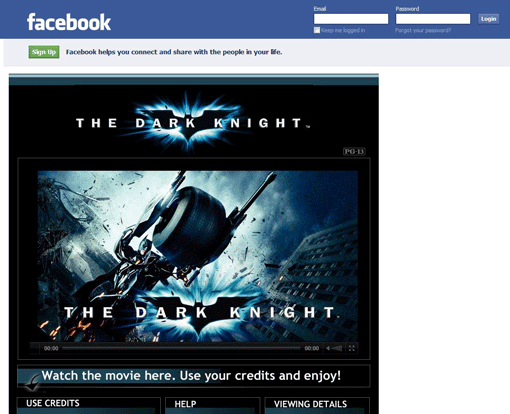Webtrends latest white paper, conducted with Adgregate Markets (a company who makes Facebook storefronts) revealed data on Facebook e-commerce pages and brand commerce websites.
The key findings were as follows…
| Statistics | |
People On Facebook
|
Activity on Facebook
|
Global Reach
|
Platform
|
Mobile
|
|
Some marketers say we live in a Google world. Now, more marketers are suggesting we live in a FB world. With the arrival of F-commerce, that is a more believable assertion.
Out of the scores of F-commerce sites we checked out, we picked the 5 best and brightest. Read why they stand out from the rest.
Now, without further ado, here is Sr. Editor Janet Roberts with our top picks for the best F-commerce sites. Take it awaaaay, JR…
1. Country Crock’s “Like-Gating” Coupon
“Like-gating” is a new trend among brands on Facebook to block access to promotions, applications or other Facebook Page benefits until the visitor has clicked the “Like” button. This promotion by Country Crock margarine, a Unilever brand, is a textbook example of how to do it right.
Here’s what sets Country Crock apart from other “Like-gating” promos:
- It uses a branded greeting page for new visitors, labeled “Greetings from Country Crock.”
- It specifies the benefits of liking the brand on Facebook, answering the visitor’s implicit question, “What’s in it for me?”
- It trades a coupon for the visitor’s “Like.”
- It tracks visitors who leave without “Liking” and uses Facebook Ads to invite the visitor back to the page until it gets a “Like.”
One quibble: The visitor must install a coupon printing app before printing out the coupon, apparently to track and regulate coupon use to prevent unauthorized sharing or multiple uses.
2. JCPenney’s “Share” Emphasis
Shopping is a social activity, something JCPenney’s Facebook catalog application remembers and even encourages by adding a “Share” button to every item on its search results page, not just to items in a shopping cart like other shopping applications.
JCP also promotes deals and incentives even before you begin to browse by department. Look for a banner ad with the current promotion and code on the “Browse Our Departments” page. The shopper doesn’t have to click out of the application and go back to JCP’s Facebook Page to take advantage of the offer.
This is a crucial benefit because shoppers have said over and over that they want discounts and other special offers from the brands they “Like” on Facebook. JCP makes it easy for its fans to take advantage of its incentives.
3. NBA Store’s Customizable Search and Sharing Options
The NBA has a high profile on Facebook. This shopping application contributes to that profile.
We like its shopping engine because it manages to compress a complex merchandise selection into the relatively small real estate of a Facebook page template without sacrificing usability or the social-shopping experience.
Its customizable search engine allows the shopper to sort merchandise by team name or event and includes multiple sharing sources: email, Twitter, sharing to the shopper’s Facebook Wall or recommending via the “Like” button.
4. Skullcandy SKDY Super Widget
“Ooo, sweet!” That’s what one member of the target market for this headphone manufacturer uttered when we showed him this widget, which mashes shopping and community building into one mobile-friendly Facebook application.
Even if you aren’t a teenage hipster type bonded to your iPod with a skateboard under one arm and a snowboard under the other, check out Skullcandy’s SKDY Super Widget. It wraps a catalog of its funky headphones and earphones inside a highly targeted mix of free content (downloadable tunes, videos, blog entries and an email opt-in invitation).
You can search, shop and put items in a cart in the Facebook app, but it takes you to a secure page at Skullcandy’s website to complete the transaction.
5. Warner Bros.’ Use of Facebook Credits
We aren’t Batman’s biggest fans, but we like this application because it shows how to use Facebook Credits to buy more than virtual farms or premium game weapons.
Facebook Credits is Facebook’s virtual currency system, which allows users to pay for products or services without having to enter bank or credit-card information. Companies in turn can sell products or services without having to create a localized payment engine or deal with fulfillment issues.
How it works: The Facebook user buys a certain amount of Facebook Credits using PayPal or a credit card or mobile-phone account. To watch “Batman: The Dark Knight,” the user can either click the video’s “Watch Now” button and approve the credit deduction or purchase credits within Facebook.

